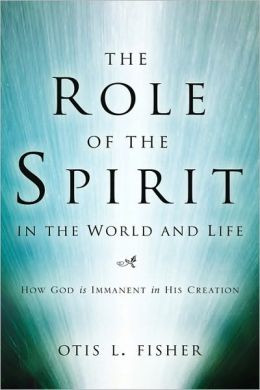Otis Fisher: The Role of the Spirit in the World and Life
 Otis L. Fisher, The Role of the Spirit in the World and Life: How God is Immanent in His Creation (Longwood, FL: Xulon Press, 2004), 159 pages.
Otis L. Fisher, The Role of the Spirit in the World and Life: How God is Immanent in His Creation (Longwood, FL: Xulon Press, 2004), 159 pages.
Otis L. Fisher, associate pastor in Churchville, VA and graduate of Louisville Presbyterian Seminary, writing to a broad Christian audience has undertaken a greatly needed task—establishing a foundation for the role of the Holy Spirit in all of life. The book can be roughly divided into two parts. Chapters one through five focus on the role of the Spirit in areas other than the life of the Christian believer or the Church in general. Chapter three expresses this well as it develops a holistic understanding of creation and the material world in such a way that the Spirit is explained as centrally connected to the physical world. Fisher says, “The Spirit then is left as the energizing component by which all things come into existence” (p. 50). Chapter four, employing the natural sciences and physics, concludes with the assertion that the Spirit is “fundamental to the basis of the universe” (p. 63). In chapter five, “The Spirit in Animate and Human Life” elaborates on the concept of breath in conjunction with the Greek word pneuma and the Hebrew word ruach to develop the foundation for one’s utter dependence on the Spirit for the continuance of daily existence.
The second half of the book becomes problematic as issues more personal are addressed, i.e. the role of the Spirit in church life, salvation, sanctification, and the future. While the author demonstrates a strong grasp of the Scriptures throughout his book, he does not recognize the personal nature of the Spirit as a living, relational, and dynamic reality in the life of the believer and the Church as regularly seen in Acts and the Pauline epistles. A consistent explanation of the Spirit’s role by Fisher is, “It is through the Spirit that we know and experience God” (p. 117). While this sounds like a personal description of the Spirit’s activity, the author consistently applies such understanding in impersonal ways: a field force (p. 145), a process of spiritual growth (p. 119), vitality, courage, strength, and hope (p. 121). Even chapters eight and nine on sanctification continue to address the role of the Spirit in a fundamentally impersonal manner.
The Spirit’s activity is primarily described as a spiritual growth force or process that occurs in relation to one’s reading of and meditation on the Bible. Such linkage results in a rigidly static understanding of a Spirit-led life (i.e. the Spirit’s activity is primarily limited to times of reading and meditating on the Bible). However, the Scriptures are full of dynamic implications of Spirit-filled living for the Christian and the corporate Church. Some examples of dynamic Spirit-filled living can be seen through a Spirit-empowered prayer life either with or without tongues (Eph. 6:18), through a prophetic anointing where one hears the voice of the Lord via a quickening of the Spirit (Acts 15:28), or through a daily sense of comfort, encouragement, and counsel as Jesus described the role of the Spirit He was to send (John 14, 16).
Category: Spirit, Spring 2007


